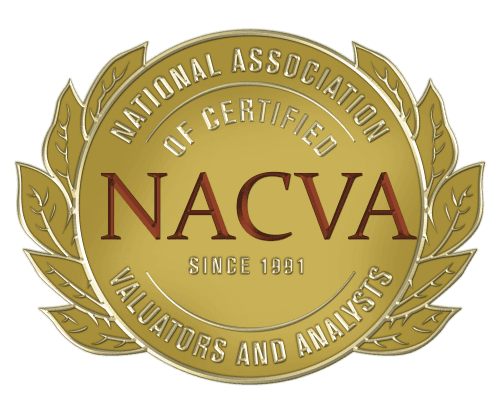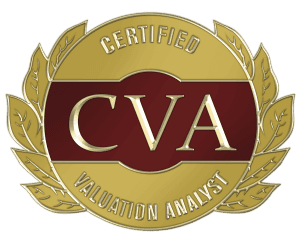Frequently Asked Questions
FREQUENTLY ASKED QUESTIONS:
How is the Value of My Business Determined?
Many business owners are aware of general rule-of-thumb guidelines as to the value of their business; however, rules-of-thumb are no substitute for a professional valuation. This is especially true where the value of the business comprises the bulk of a person’s net worth and where such value will be the foundation for funding retirement. Moreover, certain circumstances, such as in matters of estate and gift taxation, mandate a professional valuation.
Proper valuation of a business is a complex undertaking highly dependent upon such factors as the cash flow generating capacity of the business, future prospects of the business, recent transactions of like-kind businesses, tangible and intangible assets in the business and a host of other macroeconomic and business specific factors. Most significantly, value is not a static concept: it will change over time given the company’s financial performance and perceptions of its future. A seasoned valuation professional incorporates all such factors in formulating an estimate or opinion of value.
How Long Will it Take?
American Restaurant Valuators promises delivery of a draft valuation report within 30 days of receiving requested from the client. The client is then permitted time to review the report and ask questions prior to release of a final edition of the report.
What is the Difference between an Opinion of Value vs. an Estimate of Value?
An Opinion of value requires more procedures than an Estimate (sometimes called Calculation) of value. In an Opinion assignment, the valuation analyst applies valuation approaches and methods he/she deems is circumstantially appropriate. An Opinion is guided by Internal Revenue Service Ruling 59-60, which generally outlines the factors that are to be considered in the valuation of closely held stocks. Certain situations, such as estate and gift tax documentation, require a formal Opinion.
An Estimate of value is typically less formal, whereby the client and valuator agree to approaches and methods to be used and the extent of procedures the analyst will perform in the valuation of the subject interest business. An Estimate is typically less costly than an Opinion. In situations where a formal opinion is not required, an Estimate of value can save the client money. Moreover, some of our Estimate of value clients have requested a verbal report in lieu of a written calculation report.
What will I receive for my Money?
Our valuation clients receive a professionally-prepared written report. Typical length ranges from 50 to 120 pages, depending upon the complexity of the business. The report will provide sufficient information to permit the client to understand the data, reasoning, and analyses underlying the valuation analyst's opinion or estimate value. We provide bound copies of the report at no additional cost.
How Much Will it Cost?
Our survey of the market for valuation services indicates a wide range of pricing, ranging from less than $1,000 to upwards of $50,000 or more. Within those broad parameters, fees ranging from $5,000 to $20,000 for a formal opinion and $3,000 to $10,000 for an informal estimate are most common.
In general, price is commensurate with the complexity of the business. For example, the valuation of a multi-locational restaurant business would logically cost more than the valuation of a single mom & pop diner. Second, a formal opinion of value suitable for submittal for IRS reporting purposes will generally cost more than an informal estimate of value.
American Restaurant Valuator delivers a high quality work product at a very competitive price.
What if my business is not located in Texas or Oklahoma?
We are happy to serve clients outside of Texas and Oklahoma. We have completed business valuation assignments for clients located nationwide.
What is Exit Planning?
Exit planning is a process designed to facilitate business owners in making and implementing the most important financial decision of their business life: the exiting of their business. The process addresses all of the business and personal elements involved in an exit including financial considerations, management succession, legal issues, tax minimization considerations, insurance planning and wealth management issues.
Why should I Plan for My Exit?
It is inevitable that we will all someday leave our job or exit our business. Planning for the inevitable helps to maximize the probability that the departing or retiring owner has secured his/her financial well-being through retirement and has an exit strategy in place that will maximize the value of the business and/or transfer ownership to the desired successor(s). Proper planning promotes business continuity and peace of mind for the owner, for his/her family and for employees of his/her business.
What Will I Need to Get Started?
Call the American Restaurant Valuators team at (571) 283-4694 for a no-obligation discussion of your needs, or feel free to use our contact form on this website.
Many business owners are aware of general rule-of-thumb guidelines as to the value of their business; however, rules-of-thumb are no substitute for a professional valuation. This is especially true where the value of the business comprises the bulk of a person’s net worth and where such value will be the foundation for funding retirement. Moreover, certain circumstances, such as in matters of estate and gift taxation, mandate a professional valuation.
Proper valuation of a business is a complex undertaking highly dependent upon such factors as the cash flow generating capacity of the business, future prospects of the business, recent transactions of like-kind businesses, tangible and intangible assets in the business and a host of other macroeconomic and business specific factors. Most significantly, value is not a static concept: it will change over time given the company’s financial performance and perceptions of its future. A seasoned valuation professional incorporates all such factors in formulating an estimate or opinion of value.
How Long Will it Take?
American Restaurant Valuators promises delivery of a draft valuation report within 30 days of receiving requested from the client. The client is then permitted time to review the report and ask questions prior to release of a final edition of the report.
What is the Difference between an Opinion of Value vs. an Estimate of Value?
An Opinion of value requires more procedures than an Estimate (sometimes called Calculation) of value. In an Opinion assignment, the valuation analyst applies valuation approaches and methods he/she deems is circumstantially appropriate. An Opinion is guided by Internal Revenue Service Ruling 59-60, which generally outlines the factors that are to be considered in the valuation of closely held stocks. Certain situations, such as estate and gift tax documentation, require a formal Opinion.
An Estimate of value is typically less formal, whereby the client and valuator agree to approaches and methods to be used and the extent of procedures the analyst will perform in the valuation of the subject interest business. An Estimate is typically less costly than an Opinion. In situations where a formal opinion is not required, an Estimate of value can save the client money. Moreover, some of our Estimate of value clients have requested a verbal report in lieu of a written calculation report.
What will I receive for my Money?
Our valuation clients receive a professionally-prepared written report. Typical length ranges from 50 to 120 pages, depending upon the complexity of the business. The report will provide sufficient information to permit the client to understand the data, reasoning, and analyses underlying the valuation analyst's opinion or estimate value. We provide bound copies of the report at no additional cost.
How Much Will it Cost?
Our survey of the market for valuation services indicates a wide range of pricing, ranging from less than $1,000 to upwards of $50,000 or more. Within those broad parameters, fees ranging from $5,000 to $20,000 for a formal opinion and $3,000 to $10,000 for an informal estimate are most common.
In general, price is commensurate with the complexity of the business. For example, the valuation of a multi-locational restaurant business would logically cost more than the valuation of a single mom & pop diner. Second, a formal opinion of value suitable for submittal for IRS reporting purposes will generally cost more than an informal estimate of value.
American Restaurant Valuator delivers a high quality work product at a very competitive price.
What if my business is not located in Texas or Oklahoma?
We are happy to serve clients outside of Texas and Oklahoma. We have completed business valuation assignments for clients located nationwide.
What is Exit Planning?
Exit planning is a process designed to facilitate business owners in making and implementing the most important financial decision of their business life: the exiting of their business. The process addresses all of the business and personal elements involved in an exit including financial considerations, management succession, legal issues, tax minimization considerations, insurance planning and wealth management issues.
Why should I Plan for My Exit?
It is inevitable that we will all someday leave our job or exit our business. Planning for the inevitable helps to maximize the probability that the departing or retiring owner has secured his/her financial well-being through retirement and has an exit strategy in place that will maximize the value of the business and/or transfer ownership to the desired successor(s). Proper planning promotes business continuity and peace of mind for the owner, for his/her family and for employees of his/her business.
What Will I Need to Get Started?
Call the American Restaurant Valuators team at (571) 283-4694 for a no-obligation discussion of your needs, or feel free to use our contact form on this website.



